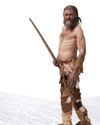
Feel the grass under you as you start rolling down the hill. You’re turning over and over, the world swirling into a kaleidoscope of green, blue, and sunlight. With every roll you can’t help but giggle. Finally, you come to a stop at the bottom, the sky and trees still whirling around you. It takes a moment for everything to settle. But that feeling of joy remains.
You’re not alone in loving this dizzying experience. Our evolutionary primate cousins— gorillas, chimpanzees, orangutans, and bonobos— are in on the fun, too.
A Dive Into Ape Twirls
Why do apes spin? This question first captured Marcus Perlman’s attention in 2011 after watching a viral video of Zola. At the time, Zola was a gorilla at the Calgary Zoo in Alberta, Canada, and he loved to spin. In 2017, Perlman saw Zola again, this time playfully spinning in a kiddie pool at the Dallas Zoo in Texas. Perlman is a cognitive scientist and lecturer in linguistics at the University of Birmingham in England. He studies the behaviors and communication methods of great apes, especially gorillas.
Initially, scientists saw spinning as a way apes might gesture to communicate meaning. Perhaps it’s similar to how some people wave their hands or nod their heads when they talk. Alternatively, researchers thought, spinning could be a form of play. It could help with balance, spatial awareness, and muscle strength—skills that are essential for survival in the wild. Perlman’s view, however, changed after seeing Zola. “Watching the video made me think there was more to it,” he says. “Something creative, more like dance.”
Diese Geschichte stammt aus der April 2024-Ausgabe von Muse Science Magazine for Kids.
Starten Sie Ihre 7-tägige kostenlose Testversion von Magzter GOLD, um auf Tausende kuratierte Premium-Storys sowie über 8.000 Zeitschriften und Zeitungen zuzugreifen.
Bereits Abonnent ? Anmelden
Diese Geschichte stammt aus der April 2024-Ausgabe von Muse Science Magazine for Kids.
Starten Sie Ihre 7-tägige kostenlose Testversion von Magzter GOLD, um auf Tausende kuratierte Premium-Storys sowie über 8.000 Zeitschriften und Zeitungen zuzugreifen.
Bereits Abonnent? Anmelden

A 12-Year-Old Girl's Election Sticker Is a Winner
VOTING IS A FUNDAMENTAL FREEDOM FOR AMERICANS, A MEANS OF DOING ONE'S CIVIC DUTY AND A WAY AN INDIVIDUAL CAN EXPRESS THEIR VOICE. In 1971, the United States lowered its voting age to 18. But that doesn't mean kids and teens under 18 can't participate in elections in various ways.

If everything the human brain does is basically sets of electrical impulses, how exactly does that translate into a state of mind?
You're not the only one asking this question. Every neuroscientist in the world is wondering the exact same thing, says Zach Mainen

EARTH'S TINIEST BUILDERS
THE HIDDEN WORLD OF MICROBES IN THE EARTH'S CRUST

MUMMIES SPEAK
ABOUT MICROBES, MIGRATION, AND MORE

GOING WITH YOUR GUT
HOW DO MICROBES AFFECT OUR HEALTH? LET'S COUNT THE WAYS...

BUG Detective
A burglar sneaks into a house on a quiet street in New York City. He walks through the house, touching countertops and door handles. Finally, he steals a single card from a full deck. Then he leaves.

Little Creatures Among Us THE MANY MICROBES IN OUR DAILY LIVES
When you think you're alone, you're actually not. In the ground, the air, your room, and even your body are Strillions and trillions of creatures so tiny you can't see them.

A Mars Rock Found With Leopard Spots Could Be a Sign of Ancient Life
IN JULY, NASA'S PERSEVERANCE ROVER CAME ACROSS A SPOTTED ROCK IN WHAT WAS ONCE A RIVERBED IN THE JEZERO CRATER ON MARS.

Para Athlete Uses Exoskeleton Suit to Carry the Olympic Torch
In July, a 36-year-old French tennis para athlete, Kevin Piette, got a chance to participate in this summer’s Olympic torch relay without using a wheelchair.

Ancient Egyptians May Have Used a Water System to Lift Stones to Build Pyramid
HOW ANCIENT EGYPTIANS BUILT THE MASSIVE PYRAMIDS IN EGYPT MORE THAN 4,000 YEARS AGO HAS LONG BEEN A TOPIC OF WONDER AND DEBATE.